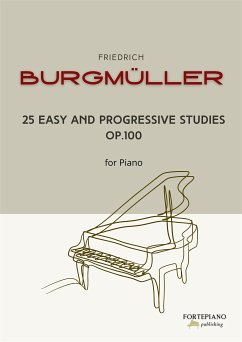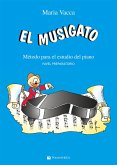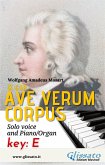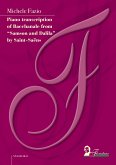The 25 Études faciles et progressives, Op.100, composed by Friedrich Burgmüller, stand as a testament to the confluence of technical skill development and musical expressiveness in piano education. Friedrich Burgmüller, a German pianist and composer who relocated to Paris at 26, is renowned for his contribution to piano literature, particularly in the realm of educational music. His Op.100, composed of 25 studies, represents a significant part of the elementary étude repertoire for young pianists, celebrated for generations.
These études are remarkable for blending technical proficiency with a musical depth that belies their educational intent. Each étude, with its descriptive title, invites both the player and the listener into a world where the technical aspects of piano playing are intimately tied with expressive musicality. This approach ensures that these studies are more than mere mechanical exercises; they become pieces of music in their own right, engaging and developing the musician's interpretative skills alongside their technical abilities.
The studies are arranged in a progressive order, starting from a level that corresponds to approximately ABRSM grade II, and gradually increasing in complexity to about grade V. This progression allows for a structured development of piano skills, ensuring that the learning process is both challenging and rewarding. The études cover a wide range of technical challenges, from legato cantabile touch in "La Candeur" to the playful and fast "L'Arabesque", each piece requiring and fostering a different set of skills.
Burgmüller's études are not only tools for technical development but also for cultivating a deeper understanding of musical form and structure. They encourage the pianist to engage with the music beyond the notes, exploring the harmonic and thematic elements that make each piece unique. This comprehensive approach to piano education ensures that students not only develop their technical skills but also grow as well-rounded musicians, capable of appreciating and expressing the nuanced language of music.
In summary, Burgmüller's 25 Études faciles et progressives, Op.100, are a cornerstone in piano pedagogy, offering a blend of technical challenge and musical expressiveness that has stood the test of time. They remain an essential part of the repertoire for budding pianists, providing a foundation upon which a lifetime of musical exploration and enjoyment can be built.
Piano method, Piano practice, Piano exercises, Piano teaching, Piano course, Piano technique, Piano teacher, Piano studies, Piano pedagogy, Classical piano, Piano skills, Piano playing
These études are remarkable for blending technical proficiency with a musical depth that belies their educational intent. Each étude, with its descriptive title, invites both the player and the listener into a world where the technical aspects of piano playing are intimately tied with expressive musicality. This approach ensures that these studies are more than mere mechanical exercises; they become pieces of music in their own right, engaging and developing the musician's interpretative skills alongside their technical abilities.
The studies are arranged in a progressive order, starting from a level that corresponds to approximately ABRSM grade II, and gradually increasing in complexity to about grade V. This progression allows for a structured development of piano skills, ensuring that the learning process is both challenging and rewarding. The études cover a wide range of technical challenges, from legato cantabile touch in "La Candeur" to the playful and fast "L'Arabesque", each piece requiring and fostering a different set of skills.
Burgmüller's études are not only tools for technical development but also for cultivating a deeper understanding of musical form and structure. They encourage the pianist to engage with the music beyond the notes, exploring the harmonic and thematic elements that make each piece unique. This comprehensive approach to piano education ensures that students not only develop their technical skills but also grow as well-rounded musicians, capable of appreciating and expressing the nuanced language of music.
In summary, Burgmüller's 25 Études faciles et progressives, Op.100, are a cornerstone in piano pedagogy, offering a blend of technical challenge and musical expressiveness that has stood the test of time. They remain an essential part of the repertoire for budding pianists, providing a foundation upon which a lifetime of musical exploration and enjoyment can be built.
Piano method, Piano practice, Piano exercises, Piano teaching, Piano course, Piano technique, Piano teacher, Piano studies, Piano pedagogy, Classical piano, Piano skills, Piano playing








